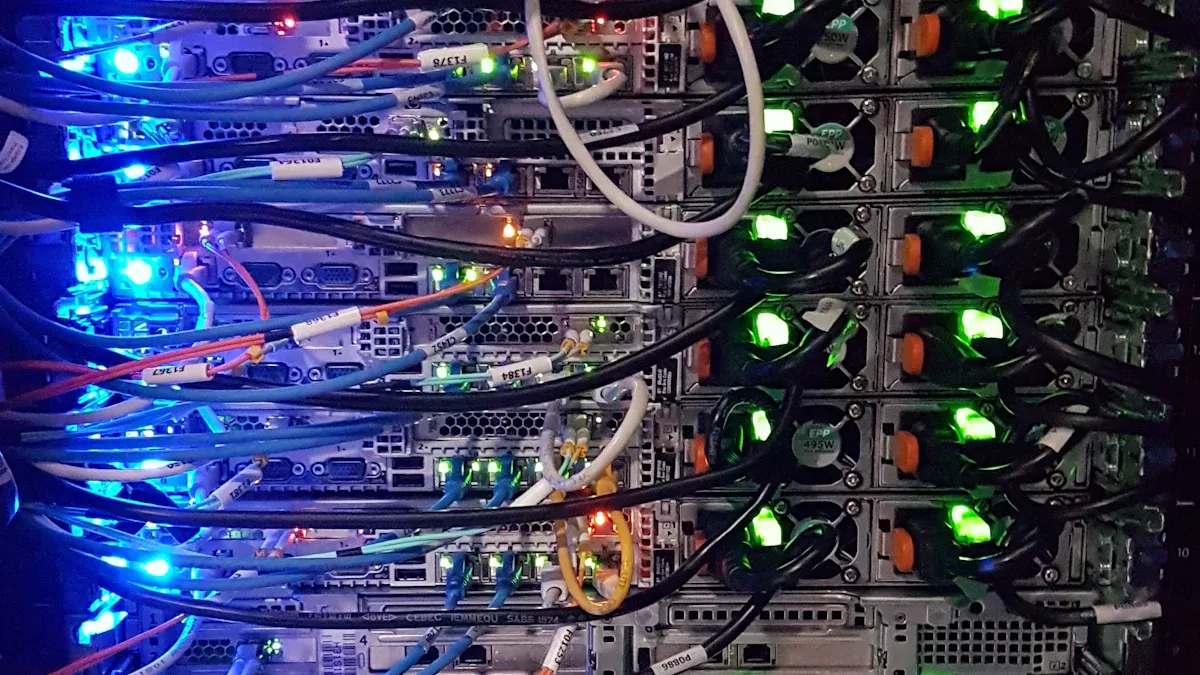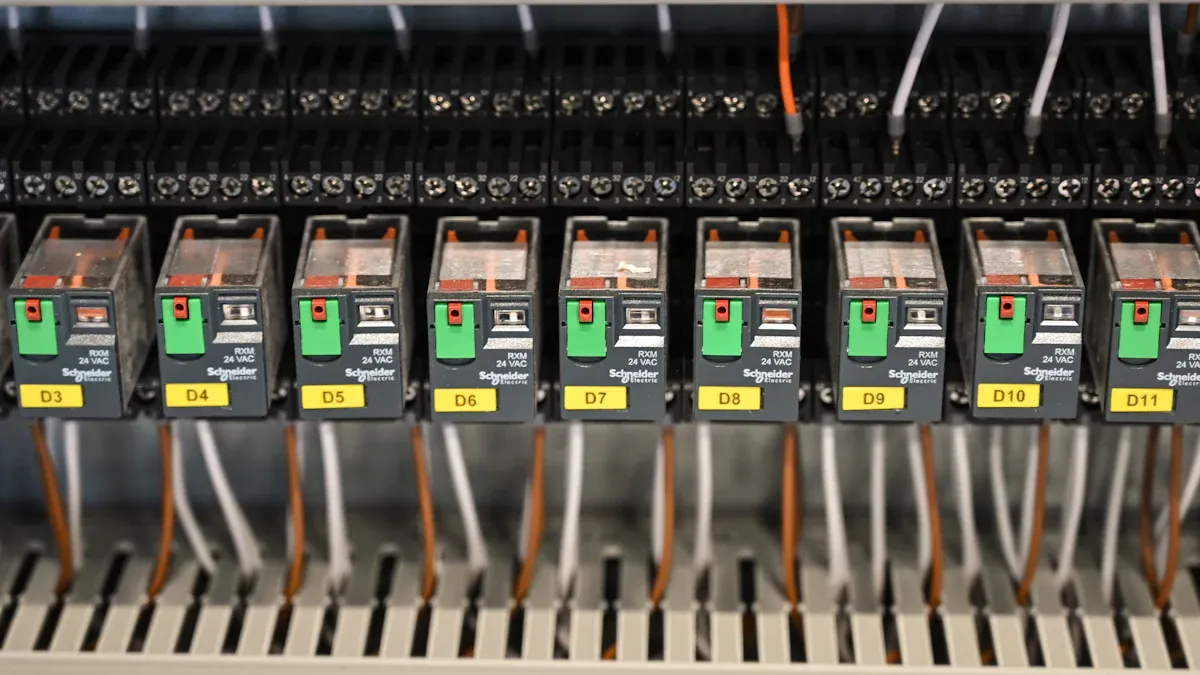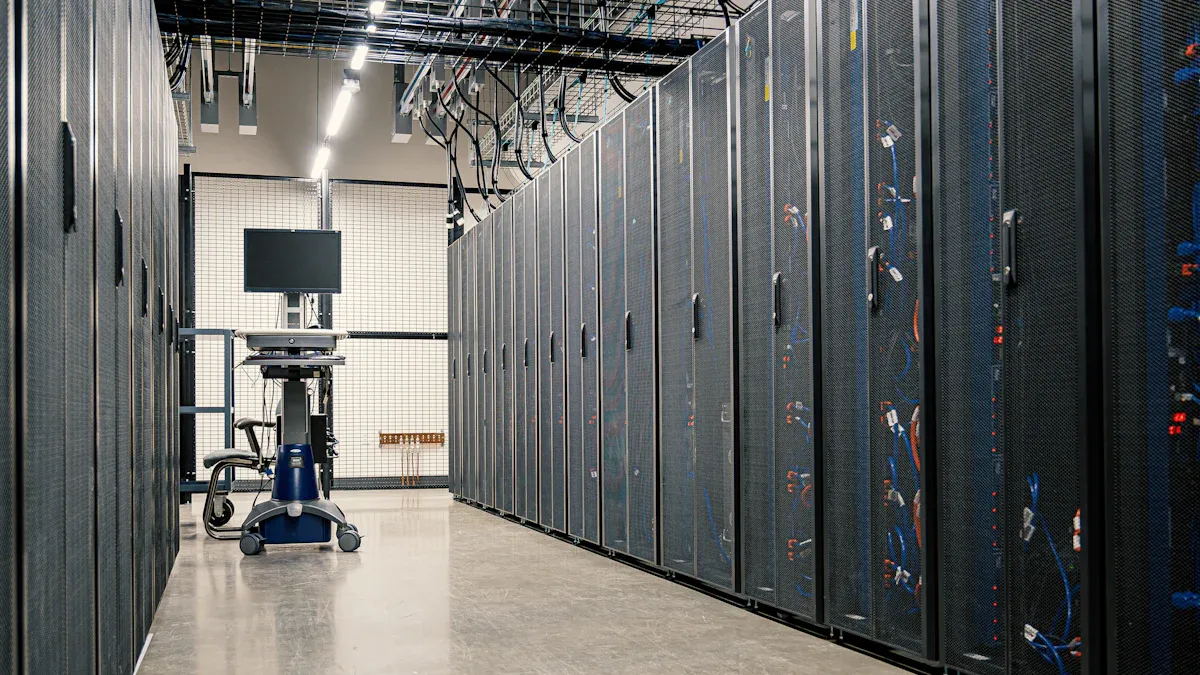© Copyright – 2010-2023 : All Rights Reserved. Sitemap
Power Distribution Unit PDU, rack mount PDU, PDU data center, Smart PDu, intelligent PDU
Power Distribution Unit PDU, rack mount PDU, PDU data center, Smart PDu, intelligent PDU
DTI-CX 2025 Digital Transformation Indonesia Conference, DATE:6-7 AUG.2025, Booth No.: C21

An effective Data Center PDU design is the backbone of your entire operation. A well-planned power distribution strategy ensures reliability and prevents costly downtime. You need a solid plan for your power infrastructure, and that plan starts with choosing the right power distribution unit (PDU)—including options like a pdu with power monitoring provided by leading PDU manufacturers YOSUN. The global data center rack PDU market is growing fast, with a projected CAGR of 9.8% from 2023 to 2030. This growth shows how important these devices are. A poor design can lead to major problems, as onsite power system failures remain a top cause of data center outages.
A strong power distribution design minimizes these risks. Your choice of PDU directly impacts your system’s stability and future growth potential.
A successful data center design begins with a deep understanding of your power needs. Before you select any hardware, you must analyze your power requirements. This foundational step ensures your power distribution infrastructure can support your current and future operations without risk.
First, you need to determine the total power consumption for each rack. An accurate calculation prevents you from under-provisioning your PDU, which can cause overloads and downtime. It also helps you avoid over-provisioning, which wastes money and energy.
💡 Pro Tip: To find your total rack power consumption, follow these steps. This process helps you size your PDU capacity correctly.
Next, you must match your PDU to your facility’s power source. The voltage, amperage, and phase of your PDU must align with the power delivered to the rack. Mismatched specifications can damage equipment. Different regions use different power standards.
| Region | Phase Type | Voltage (Volts) |
|---|---|---|
| North America | Single-phase | 120V |
| North America | Three-phase | 208V |
| Europe | Single-phase | 230V |
| Europe | Three-phase | 400V |
Properly balancing the load across phases in a three-phase power distribution system is also critical. An unbalanced load can cause serious problems for your data center pdu design. This is a key part of your overall design.
A balanced system ensures reliable power and protects your investment.

After analyzing your power needs, you must select the correct hardware. Choosing the right PDU is a critical decision. Your choice directly affects data center efficiency and your control over power consumption. Different PDU types offer different levels of control and insight, so matching the model to your operational goals is essential for building an energy efficient system.
A Basic PDU is the simplest option. Think of it as a rugged, rack-mountable power strip. It delivers reliable power distribution without any advanced features. This pdu is a cost-effective solution for environments where you do not need remote monitoring or control.
💡 When to Use a Basic PDU:
- Small Businesses: They offer an affordable way to power IT gear with low maintenance.
- Educational Institutions: They work well for simple power management in computer labs.
- Temporary Setups: Their simple design allows for quick and reliable deployment.
- Backup Systems: They ensure consistent power delivery from a UPS without extra complexity.
However, a Basic PDU only provides fundamental power distribution. It lacks the ability to measure power consumption or control individual outlets, which are key for improving efficiency.
A Metered PDU takes a step forward by adding a local display that shows power consumption data. This helps you track energy consumption accurately and avoid overloading circuits. Modern Metered PDUs provide “billing-grade” accuracy, meaning their measurements are precise within +/- 1%. This level of detail is crucial for understanding your true power usage. By monitoring the power at the rack, you can calculate your Power Usage Effectiveness (PUE) more accurately and identify opportunities to improve data center efficiency. This data also helps you find and decommission “ghost servers”—devices that consume energy without doing useful work.
A Switched PDU offers the features of a Metered PDU plus one major benefit: remote outlet control. This power distribution unit allows you to turn individual outlets on or off from a remote location. This capability is perfect for rebooting unresponsive equipment without needing someone on-site, which saves time and money. Because this pdu connects to your network, security is extremely important. You must protect it from unauthorized access.
Key security protocols include:
Using these protocols helps secure your power infrastructure and maintain operational integrity.
For complete control over your data center’s power, you need an Intelligent Power Distribution Unit. Intelligent PDUs represent the highest tier of power management technology. They combine the features of metered and switched models and add advanced monitoring capabilities. Choosing the right PDU is simple when you need total command, and intelligent PDUs deliver just that. These advanced devices give you granular control over your entire power distribution framework.
Intelligent PDUs offer a full suite of management tools. You gain precise command over your power distribution.
💡 The Smart Advantage: Intelligent PDUs provide accurate energy consumption data for each outlet. This real-time monitoring helps you identify opportunities to improve your Power Usage Effectiveness (PUE) and optimize energy use across your facility.
The true strength of intelligent PDUs is their ability to provide advanced monitoring. They integrate seamlessly with Data Center Infrastructure Management (DCIM) software. This connection gives you a single, unified view of your power infrastructure. You get enhanced monitoring and alerts that warn you before circuits fail. This level of remote monitoring helps you track power consumption trends and locate unused capacity. With intelligent PDUs, you move from simple power distribution to strategic power management. This pdu provides the accurate energy consumption data you need to make informed decisions about your energy and power consumption. Ultimately, intelligent PDUs empower you to build a resilient and efficient data center pdu.

After choosing the right type of PDU, you must ensure it physically fits your rack environment. The physical specifications of your PDU directly impact rack organization, airflow, and the reliability of your power distribution. A mismatch can create installation headaches and operational risks.
You need to select a PDU with the right form factor for your rack. PDUs come in several standard sizes, and your choice affects how you use your rack space.
Using a vertical 0U PDU is a smart strategy. It frees up valuable rack space for your IT equipment and improves airflow, which helps keep your devices cool. For a secure fit, you should use toolless mounting options. This method allows for quick and accurate positioning, ensuring the PDU remains stable and provides reliable power.
You must plan the number and type of outlets your PDU needs. This ensures you can connect all your equipment and deliver the correct amount of power. The IEC C13 and C19 are the most common outlets used globally for power distribution. Each outlet type is designed for a different power capacity.
| Outlet Type | Amperage Capacity | Typical Application |
|---|---|---|
| C13 | Less than 10 Amps | Servers, switches, and other standard IT gear |
| C19 | Up to 16 Amps | High-power servers and network equipment |
Count the number of devices in your rack and check their plug types. This helps you select a PDU with the right mix of outlets. Planning ahead prevents you from running out of connections or using the wrong outlet for high-power devices.
Modern intelligent PDUs do more than just power distribution. They can also act as a hub for environmental monitoring, which is critical for protecting your hardware.
💡 Pro Tip: You can connect various sensors directly to your PDU to monitor rack conditions in real-time. These sensors include:
Monitoring these conditions helps you maintain an optimal environment. For example, ASHRAE recommends keeping data center temperatures between 18°C and 27°C (64.4°F to 80.6°F). By using sensors, you receive alerts if conditions go outside safe limits. This proactive approach helps you prevent equipment damage, reduce energy consumption, and lower the risk of downtime by managing factors beyond just power consumption.
A great data center PDU design looks to the future. You must plan for growth and protect against failure. This ensures your power infrastructure remains reliable and efficient as your needs change.
You can significantly increase uptime by implementing A/B power redundancy. This design provides two independent power sources for each piece of critical equipment. If one power path fails, the other takes over immediately.
💡 How to Achieve True Fault Tolerance:
Data center needs are growing. Racks that once used 5 kW of power now often require much more. High-density racks can consume anywhere from 10 kW to over 50 kW of power. This trend requires a robust power distribution strategy. Standard PDUs may not handle this load. You need a pdu with high power capacity and features like locking outlets to prevent accidental disconnections. Advanced intelligent PDUs are essential here. They provide the real-time data needed for effective capacity planning, helping you manage increased power demands without overloading circuits.
Sometimes, an off-the-shelf power distribution unit does not meet your exact needs. This is where custom solutions become valuable. A custom pdu allows you to specify every detail, from outlet types and housing materials to advanced monitoring features. NBYOSUN offers custom intelligent PDUs that can be designed to scale with your operations. You can choose unique plug types for global standards or add specific environmental sensors. Building a custom pdu ensures your power infrastructure perfectly aligns with your requirements, giving you greater control and flexibility. These intelligent PDUs provide the foundation for a scalable and efficient data center.
A successful data center pdu design requires a systematic approach to power distribution. You build a reliable power system and improve data center efficiency. This pdu design helps you avoid common power mistakes like poor load balancing. Your power distribution design becomes more resilient, which reduces downtime and protects your power. An optimized power distribution plan also boosts data center efficiency, making your data center design more energy efficient. Ultimately, a smart data center pdu design creates a powerful foundation for growth, improves overall data center efficiency, and ensures your pdu delivers reliable power.
A Basic PDU simply delivers power to your equipment. A Metered PDU adds a local display. This display shows you how much power your rack is using, which helps you monitor energy consumption and prevent overloads.
You should consider a 0U PDU because it mounts vertically in your rack. This design saves valuable space for your servers and other IT gear. It also helps improve airflow, which keeps your equipment cool and running efficiently.
You might need a custom PDU when standard models do not meet your specific needs. Consider a custom solution if you require unique outlet types, specific housing materials, or advanced monitoring features tailored to your data center’s power distribution design.
A/B power redundancy provides your equipment with two independent power sources. If one power path fails, the other immediately takes over. This design prevents a single failure from causing an outage and greatly improves your data center’s reliability.
A Professional And Leading Manufacturer
For OEM
& ODM Power Distribution Unit (PDU)
You Can Trust
CONTACT
Ningbo YOSUN Electric Technology Co., LTD
Leading Professional Manufacturer in PDU Power Solutions
Contact Info.